Why we need to sort out Gender Equality in the Creative Industry
Recently I was lucky enough to attend the first 3% conference in Australia. If you don’t know what the hell this is all about, it was born in the USA out of the fact that in creative agencies at Creative Director level, only 3% of CDs are female. Yes 3%! If you’re reading this you should be outraged. Whilst this stat is focussed on creatives, we know we have a general problem of gender inequality in the creative industry when it comes to management, leadership and board levels. This conference was to highlight the issues we face, arm us with facts & figures (to help us challenge the naysayers) and most importantly to inspire action and change.
In a nutshell
DIVERSITY = CREATIVITY = PROFITABILITY
Cindy Gallop put it so simply:
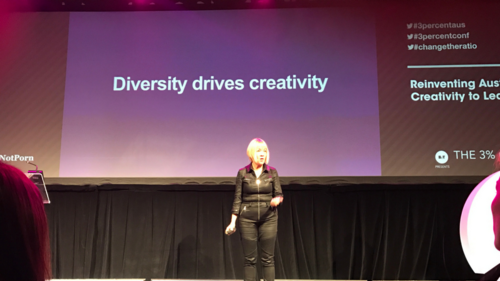
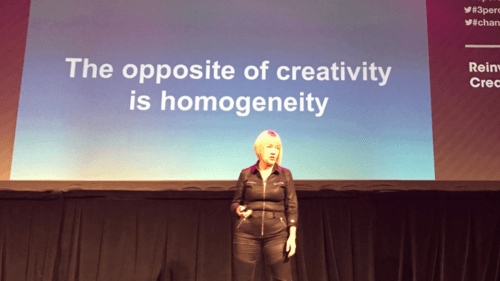
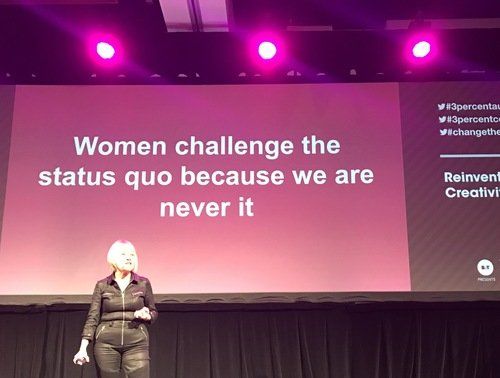
Here’s some of what I took away from the inspiring day.
(I also want to clarify that this conference was specifically about gender equality. I’m a huge believer that if we’re talking about gender equality we should be talking about equality in general; gender, sexual orientation, religion, ethnicity, socioeconomic status, etc. Why not nail it all in one go?!).
WHY DO WE HAVE THIS PROBLEM
What we know is that gender equality is not an issue at uni and advertising school, it’s also not an issue for people coming into the industry and in the first few years of their career. In fact, we know in creative teams there is a pretty even split between males and females and in Account Management (which are the roles I focus on) it’s slightly skewed to females.
The problem comes in the middle of women’s careers. And it’s typically because of one thing: Babies. Nappies. Sleepless nights. Maternity Leave. Most women don’t jump straight back to work after having children. Fair enough I say.
What happens next to these awesome career goal-kicking women is a familiar story:
- They take some time out of their career to raise their kids
- There's a lack of affordable childcare, and fines if you're late for pick up
- They try to come back to work but struggle to get the balance right between the demands of toddlers and the demands of the office, and often their confidence has taken a knock after time out of their roles
- They seek part time work or flexible work, but the agency says ‘sorry but that’s just not possible in your role’, ‘the clients need someone full time’, ‘the team need their leader there every day’
- So they take a step back in their role, responsibility, and pay
- They get passed over for promotion as they ‘have other focuses beyond their career’
- Or they don’t return at all
- Or they go and work on the client side where it’s easier to get flexible working
- Or they start their own business
The result:
Less awesome women advance their careers in the creative industry.
Gender inequality at the top.
Of course there are other reasons that we don’t have gender equality at the top
- Women are less inclined to go for new roles or promotions unless they are sure they can do 10/10 of the requirements of that role (conversely men will go for it if they only hit 6/10 requirements)
- General human biases mean that we have a tendency to hire and promote those like us. Therefore if leadership teams are more male skewed they are more likely to hire and promote males thus perpetuating the issue.
- Lack of female role models at the top; if women can't see enough other women in leadership; how can they aspire to achieve it for themselves
FEEL GOOD FLUFF?
If you’re wondering if this is a bit of a fluffy, feel-good issue, let’s talk bottom line. At the 3% conference, we heard many facts & figures from research all around the world which showed a simple fact; companies with strong gender equality at the board level are more profitable. On average 6% more profitable. Boom!
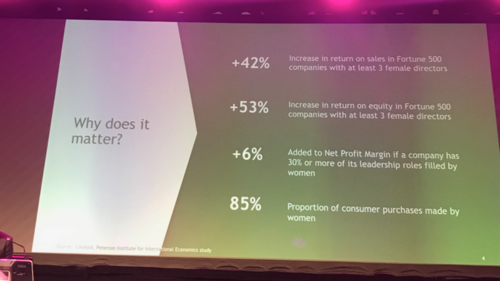
DIVERSITY = CREATIVITY = PROFITABILITY
BIG ACTIONS & MICRO ACTIONS
Whenever a big change is needed people often get scared about that change and overwhelmed about how to make it happen. Sure, we need some major shifts which has to come from leadership teams. Boston Consulting Group said; ‘Set goals about what you want to achieve in equality, measure progress, review & refine.’
But we also learned that everyone can play a part. Everyone can make change through micro actions, from the ground up.
At one of the conference panels, we heard from M&C Saatchi and CHE Proximity about the micro actions they are already taking.
- M&C Saatchi; better maternity pay, flexible working, breastfeeding rooms, the launch of Women & Creative (an 'incubator' program)
- CHE Proximity; full time pay for mums doing a 4 day week, not holding meetings at drop-off/pick-up times, training programs during maternity leave, re-boarding programs.
- They also referenced the DDB Phyllis project which is aiming for 40% of women on the board by 2018. A lovely ambitious goal!
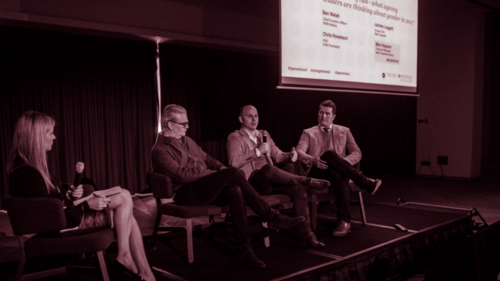
Manbassador panel moderated by Mim Haysom (General Manager, M&C Saatchi Sydney). Ben Welsh (Chief Creative Officer, DDB Sydney), Chris Howatson (Chief Executive Officer, CHE Proximity Australia), Jaimes Leggett (Group CEO, M&C Saatchi)New Paragraph
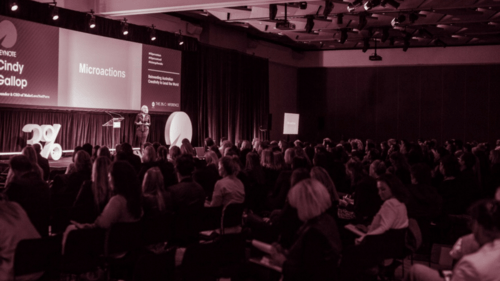
Here are some other micro action ideas for you
- Talk more; if you’re thinking of leaving the creative industry because of some of the points here, tell your agency about it. They might have options for you but if you don’t ask you won't get
- Be mindful of your own biases - take the Harvard Uni implicit bias test
- 20 things agencies can do to retain mums in creative leadership (note some points reference the USA market)
- Get your agency 3% certified
- Find a female mentor to inspire you
- Promote people because of their potential (as opposed to they’ve been doing the job for a certain amount of time)
- Implement no emails after 6:30 (allows everyone to switch off and have a life!)
And some general micro actions for gender equality beyond careers
- Back some female led start-ups at iFundWomen.com
- Shop brands with female leaders to create gender equality, find out how here
So readers, I hope you’re thinking about what micro actions you can take now. So am I. My job is all about getting the best talent into creative agencies. We are already looking at what we can do (blind CVs, more diversity training, pushing back on hiring managers, promoting flexible working, measuring changes with year-on-year stats) but there’s always more we can do.
Watch this space!
Jo
Jo Gobbo is a Senior Talent Consultant at iknowho.
http://www.3percentconf.comNew Paragraph










